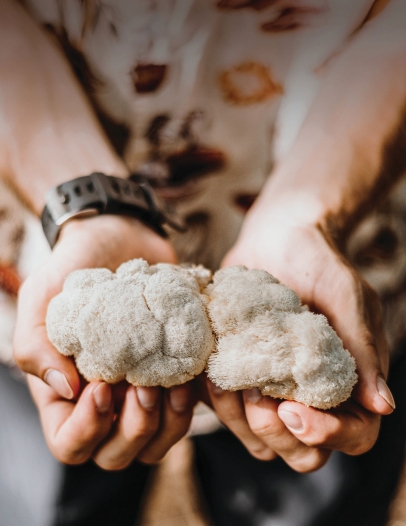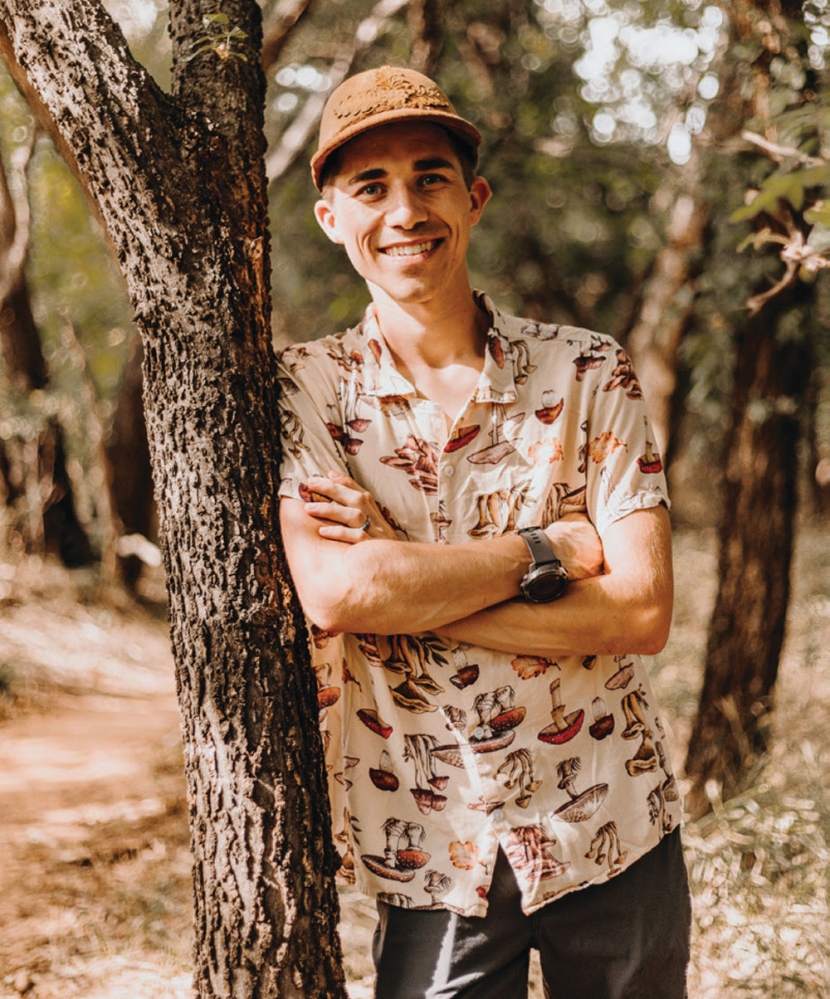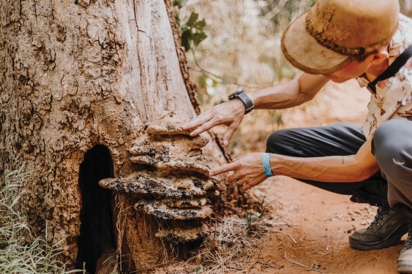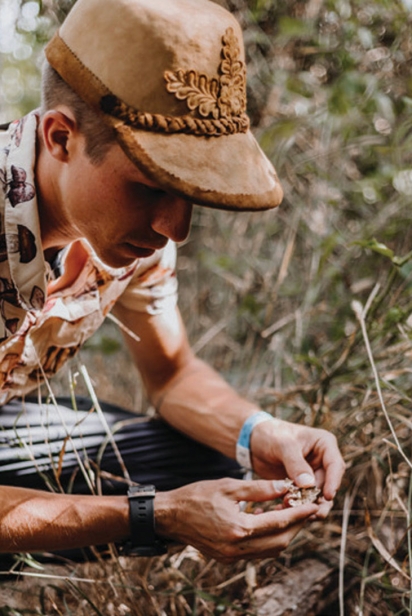Foraging Ahead
Some days, you find mushrooms. Other days, mushrooms find you.
The latter scenario defines Oklahoma Fungi founder Jacob DeVecchio’s favorite foraging moment. Walking through a forested area of Edmond, DeVecchio said, he and his wife were not looking for mushrooms. He didn’t have his usual gear; he had left his bags, tick spray, and knife at home. They were simply taking their dog for a walk when it appeared out of nowhere, like magic: a pre-season morel. DeVecchio screamed in delight (scaring his wife), then the two gathered as many morels as they could, using spare doggy waste bags to tote their loot home.
“Typically when I go out into the woods, I see snakes, I see ticks, I get smacked by thorns — but on this day I was just walking with my wife and our dog, and it was just a beautiful, blessed day,” he recalls.
DeVecchio is a self-taught mushroom specialist, continually spreading his knowledge online and at public forums. Though he doesn’t have a degree in science, he said a microbiology course in college turned him on to mycology.
“The professor mentioned that fungi were super understudied. He said that there were multimillion-dollar companies around the world doing research on them, but for the most part when people think about mushrooms, they think about the ones that kill you,” says DeVecchio. “It really sparked my interest in everything that lies in between the two polar opposites of the ones that will kill you and the ones that will feed you. And so, for me, I was like, ‘How much more is there to discover? How much more is there to learn?’ That was how I fell down the rabbit hole in 2018.”
In the years that followed, DeVecchio studied copious content from used textbooks and YouTube, expanding his understanding and appreciation of mushrooms.
“Mushrooms had me hooked because they're a cornerstone in nature. Fungi are everywhere, on every continent. You cannot escape them. For me, that was so cool,” he says.
DeVecchio didn’t translate his passion into a business until 2020, when losing his job during the COVID pandemic forced him to rethink his career. Oklahoma Fungi took root (or “mycelium,” as a mushroom’s rootlike structure is called) because, DeVecchio said, growing mushrooms is easy, and he believed it should be made accessible to all. Today, his company sells more than 100 different mushroom-growing products — everything you need, including spores, grain bags, substrates, and containers. DeVecchio continually forages for mushrooms to bring back to his lab, where he replicates and packages the spores. Most are from Oklahoma mushrooms, but he does carry several out-of-state spores as well.
“Every month of the year, I'm foraging,” DeVecchio says. “I can find edible mushrooms every month of the year, even in the dead of winter and in the heat of the summer.”
“Every month of the year, I'm foraging,” DeVecchio says. “I can find edible mushrooms every month of the year, even in the dead of winter and in the heat of the summer.”
Mushrooms require rain to grow, but Oklahoma typically receives rain throughout the year. Summer is prime time to find ground-growers. In the drier winter months, it’s best to look upward, as mushrooms tend to pull their moisture from trees. Laws in Oklahoma prohibit foraging on public land, so DeVecchio gravitates to the Chickasaw National Recreation Area, where he can legally snag edible varieties such as morel, chanterelle, oyster, chicken-of-the-woods, reishi, and lion’s mane, among others.
“They have really great foraging; they actually allow one 5-gallon bucket per person per year,” DeVecchio said. “That’s more than enough mushrooms for me.”
When it’s time to savor your fungal bounty — whether foraged, homegrown, or store-bought — DeVecchio recommended cooking the moisture out before adding butter or oil. The extra water content, he says, accounts for the squeaky texture that can turn diners off. For the best flavor, he recommends growing your own mushrooms or buying fresh from local farmers markets. Store-bought mushrooms are still great quality, he said, but the flavor is less pronounced since they have a longer shelf life.
“I like getting people engaged and learning — and even eating their own food that they grew,” DeVecchio says. “It's not just about buying my grow kit; it's actually about seeing the process and understanding how mushrooms work. When you see them in nature, or your child sees them and wants to know, ‘What’s a mushroom?,’ you can actually break it down.”
DeVecchio is a major mushroom promoter. Oklahoma Fungi has produced more than 100 videos on its YouTube channel, sharing best practices in growing, foraging, and cooking mushrooms as well as advocating for medicinal mushroom research initiatives within Oklahoma. He strongly supported House Bill 2107, which would have allowed universities and research facilities in Oklahoma to conduct research on psilocybin and psilocin for the treatment of PTSD and other ailments. The bill passed in the House, but it was stalled in a Senate committee when the session ended last year. Regardless, DeVecchio continues to support the cause.
In addition, Oklahoma Fungi has partnered with the City of Edmond, the City of Oklahoma City, and the Oklahoma Department of Agriculture to increase public awareness about poisonous mushrooms. In 2022, DeVecchio presented 45 educational forums. This year, he’s focused his efforts on writing an Oklahoma mushroom guide and organizing a festival. He plans to distribute his published guide at the Oklahoma Mushroom Festival on Oct. 15 at the Farmers Public Market, presented by Oklahoma Fungi.
Though DeVecchio celebrates the diversity of mushrooms growing throughout Oklahoma, he said his favorite one is the morel — because it’s the only one that can’t be grown indoors.
“I appreciate that [the morel] comes with a bit of adventure, that you actually have to get out there and look for it,” he says. “It only grows about a month to a month-and-a-half out of the year — it's very particular to the time, the temperature, the rain, the season, and the area that you're in. Once you really start to get out and find them, it'll kind of become addicting. You’ll always want to go out and look for them.”
If you walk the woods enough, you might just stumble across an edible mushroom when you aren’t even looking. No doubt more can be found in the surrounding soil. An unexpected harvest uncovered in the wild — that’s always a fantastic forage.
More details about the Oklahoma Mushroom Festival and Jacob DeVecchio are online at oklahomafungi.com.







